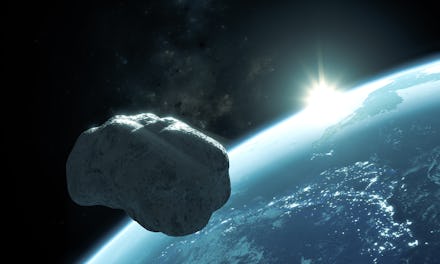The asteroid that killed the dinosaurs also turned our oceans into acid

About 66 million years ago, the reign of dinosaurs was brought to an end when an asteroid hit the earth. Most people are familiar with that part of the story, but that's not actually where it ends. Recently, new research found that the dinosaur-killing asteroid turned oceans into acid. While oceans full of acid sounds like the stuff of nightmares, it's relevant to us now, because the acidification is happening again.
When it comes to the Cretaceous-Paleogene die-off, or the K-Pg mass extinction event, intense volcanism is often cited as the cause. However, the paper originally published in the Proceedings of the National Academy of Sciences says otherwise.
See, when the asteroid hit, it crashed into the Yucatán Peninsula which was essentially an old-buried reef containing sulphur-rich rocks. This crash sent a bunch of old organic material into the air — and you know the saying: what goes up most come down.
What came raining back down was nitric oxide and sulfuric acid which ended up accumulating in the oceans. All of this led to its increased acid levels. According to the Atlantic, the ocean's acidification may have lasted for under 1,000 years but that's enough to kill off entire ecosystems.
With the paper in mind, it seems that all three of the world's worst mass extinctions, including the End-Triassic extinction and the dread End-Permian Event, featured ocean acidification. And today, our oceans are already becoming increasingly acidic — without the help of any asteroids.
You can largely trace current increasing ocean acidification back to carbon emissions. At least one-quarter of carbon dioxide released by burning coal, oil, and gas ends up dissolving in the ocean, according to the Smithsonian Ocean Portal.
Last month, a report from the Intergovernmental Panel on Climate Change found that the planet's oceans have become about 0.02 pH units more acidic every decade since the late 1980s. However, the Smithsonian Ocean Portal noted the ocean pH is expected to drop by 0.4 pH units by the end of the century if carbon emissions aren't stopped. A drop in pH levels means that there's more acid.
In the case of the K-Pg extinction, the ocean's pH only dropped by 0.25 pH units in the years after the strike. If that was enough to cause a mass extinction for the dinosaurs, current ocean acidification is almost guaranteed to impact humans.
Ocean acidification by itself may not lead to the level of catastrophe seen with the K-Pg mass extinction. However, other environmental catastrophes can come into play alongside it, and their impacts won't leave right away.
"We may think of [acidification] as something to worry about for our grandchildren," Michael Henehan, the study's lead author, told the Guardian. "But if it truly does get to the same acidification as at the [meteorite strike] boundary, then you are talking about effects that will last for the lifetime of our species. It was hundreds of thousands of years before carbon cycling returned to normal."